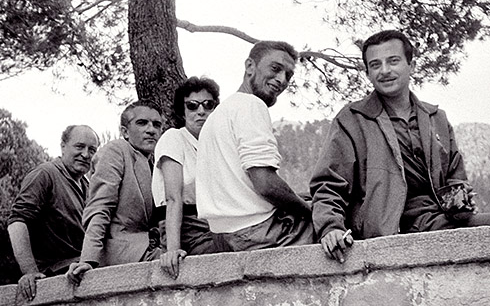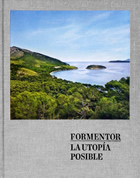The poets' club. Hotel Formentor
I am simply in love with scenery. On one of my pilgrimages around the Mediterranean, I discovered this remarkable spot and my globe-trotting days were over. This quote was originally made by Adan Diehl, a millionaire of Argentinean origin, and the spot in question is Formentor, the peninsula located at the top end of the Serra de Tramuntana. It was there that Diehl opened Hotel Formentor in 1929, a hotel that still stands out like a white dot amid the scenery even today. A house initially intended to accommodate his numerous artist and poet friends, it was transformed into a hotel miraculously equipped with electric lights, telephones, and hot running water in all its rooms for eighty select guests.
The hotel has accommodated and still accommodates well-known guests from all over the world: tycoons, politicians, business entrepreneurs, artists, writers, actors, scientists, bullfighters, princesses etc. Leading figures of the day stay at Hotel Formentor. A list of some of its guests bears witness to the hospitality that it dispenses: Churchill, the Dalai Lama, Grace Kelly, Vicente Alexaindre, Octavio Paz, Charlie Chaplin, Audrey Hepburn, Severo Ochoa, Laurence Olivier, Gary Cooper, Peter Ustinov, Fernando Rey, Julio Iglesias, Berlanga, Plácido Domingo, Concha Velasco, and Carlos Fuentes, among others...
As for Hotel Formentor's guest book! On a blank page, Nobel prize-winner for literature Miguel Ángel Asturias wrote: Sesame that transports me to my lake in Atilán, Guatemala, without moving from the window of my room. Thank you for such a favour. Dreaming with my eyes wide open. How marvellous!

Adan Diehl, an Argentinean millionaire, bought the Formentor estate from the family of eminent poet Miquel Costa i Llobera
Thirty years after its inauguration in 1959, Bartomeu Buadas was the manager of Hotel Formentor. He had inherited Diehl's cosmopolitan, entrepreneurial spirit, and he was also a friend of Camilo José Cela. When he found out that the future Nobel prize-winner planned to organize a series of debates on poetry among poets of different languages, Buadas offered him the hotel facilities, as well as preparing a Poets' Club, which publisher and writer Carlos Barral described thus: A sailing club that never came to be, built in a rocky spot opposite a little islet with wild goats, which Camilo had christened thus to mark the occasion and close to which he had positioned big cages for parrots.
The following year, as part of the International Symposium on the Novel, the Formentor Awards and Prix International des Éditeurs were created, both with a prize of 10,000 dollars. This was the highest sum ever granted for a literary award. Representatives of some of the world's leading publishing houses met at the hotel: Gallimard (Paris), Einaudi (Turin), Weidenfeld & Nicholson (London), Rowolhlt Verlag (Hamburg), Grove Press (New York) and Seix Barral (Barcelona). At the first edition, the winner of the Formentor Award was Juan García Hortelano for Tormenta de verano, published simultaneously in twelve languages, while the International Award was shared equally by Samuel Beckett and Jorge Luis Borges. The name Formentor thus became internationally linked with the world of literature. However, that burst of freedom and intellectualism would not last very long. The Franco dictatorship prohibited the event and the name was conserved for some years but not the symposium, which was moved to Corfú.
Why, in this article, do we talk about the arts and intellectuals, rather than comment on parties and summer nights, as gossip magazines do? The answer lies in the hotel's origins.
Adan Diehl, the Argentinean millionaire (1889-1953), bought the Formentor estate from the family of eminent poet Miquel Costa i Llobera (1854-1922), who had owned it since time immemorial. Born in Pollença into a wealthy family, the author of the celebrated poem 'El Pi de Formentor', had studied law and travelled to Paris to see the world. The same was also true of Adan Diehl, but while Costa i Llobera heard the voice of God and became a priest, Diehl was more attracted by the devil. In Paris, Diehl, who was also a poet, frequented artistic circles, making friends with the painter Anglada-Camarasa. The latter spoke to him of a place and of mountains that meet with the sea, where every day, when the sun sets, painters put down their their brushes to applaud.
Text by Cesc Mulet
Translated by Rachel Waters
Did you know that...
During the Spanish Civil War (1936-1939) and post-war period, black marketeering was common throughout Spain. This consisted of illegal exchanges of food for other essential goods. The Spanish word estraperlo stems from the names of two Dutch people, Strauus and Perl, who introduced a roulette wheel that turned out to be fraudulent, first to the casino in San Sebastian and then to Hotel Formentor. The ensuing scandal was so great that it led to the fall of Alejandro Lerroux's Radical Party during the Second Republic.
Bibliography

Formentor: la utopía posible
This book, published to mark Hotel Formentor's 80th anniversary, looks back at the hotel's origins and its subsequent management by the Buadas family and Barceló group. A fascinating work by Carme Riera, it contains extensive photographic records and upholds the concept of Formentarization (selective tourism) as opposed to Balearization (uncontrolled tourism development), extolling a hotel that has led to the protection of the north part of the Serra de Tramuntana.
Author: Carme Riera
Published in Palma de Mallorca by Grupo Barceló, 2009




